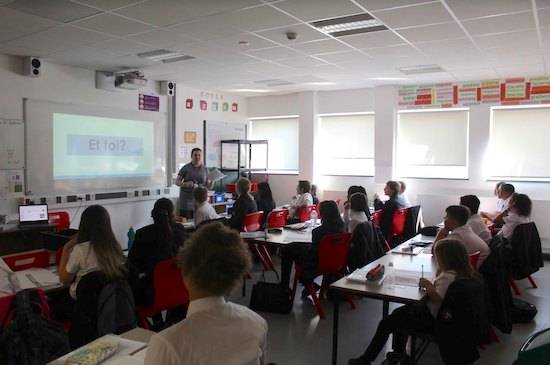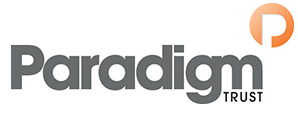Expert in Languages
By focusing on mastering the basics of foreign languages Paradigm Trust is achieving excellent progress figures and giving its pupils the foundation they need to succeed in the future.
Paradigm’s approach to teaching modern foreign languages focuses heavily on the spiral curriculum method, rather than covering a wide range of subjects and topics in little depth. By revisiting the same grammatical structures again and again, teachers embed the linguistic foundations which students need to fully comprehend so they can successfully progress in their understanding of the language. So in the current curriculum for example, the present tense is studied several times in Year 7, until teachers are confident the pupils understand the concept and know what they’re doing. Once they reach this point then teachers will add more in, but again keep revisiting the concepts in different topics so the students continue to grow in confidence. By doing this, pupils are able to gain mastery of these vital foundation building blocks.

As with all subjects across Paradigm, a lot of focus is placed on retrieval practice. Throughout the year teachers revisit what has been taught and check that pupils have understood it and can recall that information. This can take many forms, such as low stakes tests and spaced practice, so students see those same things again and again but in different contexts, to ensure they really understand what they’re talking about and that the solid foundations are there.
Learning foreign languages isn’t only for secondary school students; Paradigm has a keen focus on teaching languages in its primary schools too. Nationally this is traditionally seen as a challenge; firstly because there is a shortage of teachers at that stage with the skills or experience to teach a foreign language – many primary schools don’t have a specialist foreign languages teacher at all. Secondly, establishing time for foreign languages in the curriculum can also be an issue, as other subjects may take priority.
To overcome these challenges, Paradigm employs a specialist languages teacher for its London primary schools, who splits her time between Solebay Primary, Old Ford Primary and Culloden Primary. This way the children at all three schools can benefit from specialist teaching at a stage where they would normally not receive any. It also puts them in an advantageous position when they make the transition to secondary school and start studying foreign languages in more depth.
In Ipswich, Paradigm employs a different strategy, with both its primary academies, Murrayfield and Piper’s Vale, using a carefully selected bought-in scheme which has been chosen as it closely mirrors the London school’s programmes, and fits well with the Paradigm pedagogy.
When it comes to choosing what language is taught in its primary schools, Paradigm ensures it is one that correlates with what is being taught in the local secondary school. Currently this means the London schools learn Spanish as that is the language which is predominantly taught in the surrounding secondary schools, while in Ipswich, Murrayfield and Piper’s Vale teach French, the main language learnt at Ipswich Academy.
At both primary and secondary school Paradigm is careful to use examples which show people around the world who speak French and Spanish, not just in their home countries. In this way children get a greater understanding and appreciation of different cultures and how language spreads around the world.
The ability to speak a modern foreign language is more beneficial now than it has been for a generation. In terms of business links and employability, the skill is highly in demand – recent events mean that as a nation we will be trading directly with more countries than before, and the ability to communicate effectively, and understand the culture, will be invaluable.
The demand for foreign language speakers isn’t restricted to the business and trade sectors either. Many public organisations such as the NHS and the police require employees with linguistic skills, as do private companies in a range of industries from construction to accounting and finance.
The comparative scarcity of bilingual and multilingual speakers in this country is reflected in the wages on offer for positions which require these skills. A recent study by Preply found that people with Arabic as a second language can earn as much as 74% extra, compared to the average UK salary, with Mandarin increasing wages by 45%, and French by 34%. While it is impossible to teach every language, studies have proven once someone has learned one foreign language, they can pick up further languages more quickly.
Learning another foreign language also develops a range of transferrable skills, such as communication and presentation abilities. It also builds understanding and appreciation of other cultures, which are really important qualities in today’s society, and when dealing with other nations.
The success of remote working during the pandemic has opened another window for foreign language speakers. Over the last year and a half many businesses across the globe have discovered and embraced the benefits of remote working. This means people are no longer restricted by their physical location when it comes to building a career. Instead they can seek employment with firms around the world without having to move – and people who are able to speak foreign languages will have an important advantage.
The Department for Education is currently considering amending the subject content requirements for GCSE modern foreign language qualifications. The proposed changes involve a greater focus on stripping back the amount that is taught, a similar approach to how Paradigm already teaches foreign languages. There will also be more emphasis on teaching phonics, which is another area Paradigm has looked at – it adjusted the curriculum to do this in September 2020, and continues to embed it.
By focusing on what works, Paradigm is ensuring its pupils are making great progress in foreign languages – in 2018 the progress score was 0.89, and in 2019 it was 1.10. Using a process of continual feedback and review the Trust can make sure its pupils are being taught languages in the most effective way and will be able to take full advantage of the opportunities arising for foreign language speakers.
